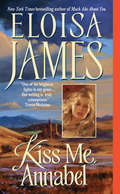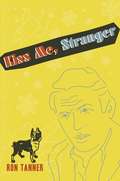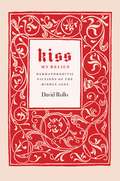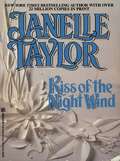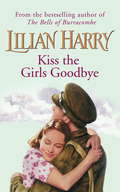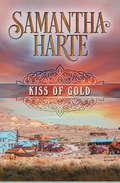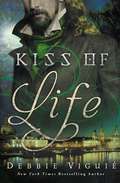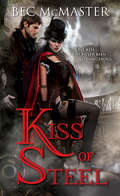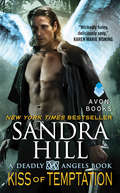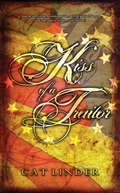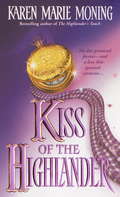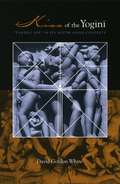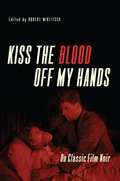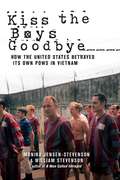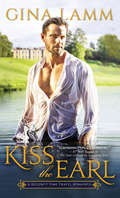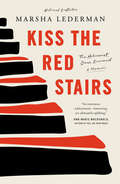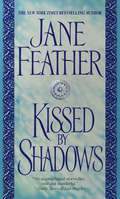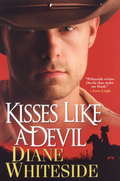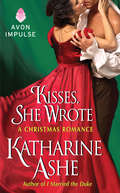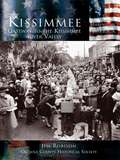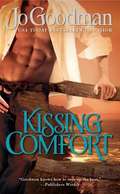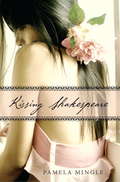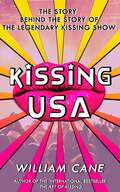- Table View
- List View
Kiss Me, Annabel
by Eloisa JamesThe rules of marriage . . . according to Miss Annabel EssexA husband must be:Rich.Make that very rich. She's had enough of leaky roofs and thread-worn clothing.English.London is the center of the civilized world, and Annabel has a passion for silk and hot water.Amiable.Good-looking would be nice, but not necessary. Same for intelligent.Isn't she lucky? She's found just the man! And her chosen spouse is nothing like the impoverished Scottish Earl of Ardmore, who has nothing but his gorgeous eyes, his brain--and his kisses--to recommend him.So what cruel twist of fate put her in a carriage on her way to Scotland with just that impoverished earl and all the world thinking they're man and wife? Sleeping in the same bed? Not to mention the game of words started by the earl--in which the prize is a kiss. And the forfeit . . . Well. They are almost married, after all!
Kiss Me, Stranger
by Ron TannerSet in an unnamed country sometime in the past, present, or future, Kiss Me, Stranger is the story of one woman's attempts to keep her family together while a civil war rages around her.Penelope, her husband and her fourteen children live in a small war-torn country built atop a landfill. After her husband and eldest son are drafted by opposing factions in the war, Penelope and her remaining children, desolate and nearly starving, are forced to scavenge for scrap--comprised of discarded consumer goods such as computers, televisions and automobiles--in the bombed-out city. When the government scrap collector makes an unreasonable demand in already unreasonable circumstances, Penelope slaps him across the face, leading to her arrest. Her subsequent escape sends her family on a journey literally into the heart of the landfill, where they come face to face with the stupidity, destruction and at times, dark humor, of war and modern consumer society.Featuring over fifty illustrations by the author, Kiss Me, Stranger is a comical and tragic commentary on war, violence, and consumerism.
Kiss My Relics: Hermaphroditic Fictions Of The Middle Ages
by David RolloConservative thinkers of the early Middle Ages conceived of sensual gratification as a demonic snare contrived to debase the higher faculties of humanity, and they identified pagan writing as one of the primary conduits of decadence. Two aspects of the pagan legacy were treated with particular distrust: fiction, conceived as a devious contrivance that falsified God's order; and rhetorical opulence, viewed as a vain extravagance. Writing that offered these dangerous allurements came to be known as "hermaphroditic" and, by the later Middle Ages, to be equated with homosexuality. At the margins of these developments, however, some authors began to validate fiction as a medium for truth and a source of legitimate enjoyment, while others began to explore and defend the pleasures of opulent rhetoric. Here David Rollo examines two such texts--Alain de Lille's De planctu Naturae and Guillaume de Lorris and Jean de Meun's Roman de la Rose--arguing that their authors, in acknowledging the liberating potential of their irregular written orientations, brought about a nuanced reappraisal of homosexuality. Rollo concludes with a consideration of the influence of the latter on Chaucer's Pardoner's Prologue and Tale.
Kiss My Relics: Hermaphroditic Fictions of the Middle Ages
by David RolloConservative thinkers of the early Middle Ages conceived of sensual gratification as a demonic snare contrived to debase the higher faculties of humanity, and they identified pagan writing as one of the primary conduits of decadence. Two aspects of the pagan legacy were treated with particular distrust: fiction, conceived as a devious contrivance that falsified God’s order; and rhetorical opulence, viewed as a vain extravagance. Writing that offered these dangerous allurements came to be known as “hermaphroditic” and, by the later Middle Ages, to be equated with homosexuality. At the margins of these developments, however, some authors began to validate fiction as a medium for truth and a source of legitimate enjoyment, while others began to explore and defend the pleasures of opulent rhetoric. Here David Rollo examines two such texts—Alain de Lille’s De planctu Naturae and Guillaume de Lorris and Jean de Meun’s Roman de la Rose—arguing that their authors, in acknowledging the liberating potential of their irregular written orientations, brought about a nuanced reappraisal of homosexuality. Rollo concludes with a consideration of the influence of the latter on Chaucer’s Pardoner’s Prologue and Tale.
Kiss Of The Night Wind (Zebra Historical Romance Ser.)
by Janelle TaylorLeaving her brother's outlaw gang, Carrie Sue Stover starts a new life as Carolyn Starns, schoolteacher, but an attack on the stagecoach she is riding brings her right back into the world of outlaws.
Kiss The Girls Goodbye
by Lilian HarrySet in a Lyon's Corner House in London, this is the second novel in the series set against the backdrop of the Second World War which began with CORNER HOUSE GIRLS.'The Corner House was making a good job of New Year's Eve, despite the bad weather, the blackout, the looming threat of rationing...The Nippies were dashing to and fro with their big silver trays and the war seemed suddenly far away.' So begins 1940 for the Nippies at the Lyons Corner House at Marble Arch. But despite putting on a cheerful face for the customers, the war is taking its toll on all the waitresses: for Maggie, married just a few hours and then parted from her husband; for Jo and Phyl, anxiously waiting for news from their fiancés; for Etty, and the constant jibes she faces about her background; and even for Irene, who begins a new friendship which is not all it appears to be...
Kiss of Gold
by Samantha HarteA young Englishwoman goes searching for her father in America, only to find love and adventure on the Colorado frontier in this historical romance. England, 1893. In order to maintain her family&’s elegant Bethinghamshire home, Daisie Browning faces the unhappy prospect of marrying for money—until she resolves to seek out her lost father in America. Traversing the Atlantic and the country&’s wild terrain, Daisie is prepared for adventure and danger. But the last thing she expects to find on her journey is love. When she finds herself stranded, robbed, and beset by swindlers in an isolated Colorado mining town, Daisie reluctantly accepts the help of the handsome and rakish Tyler Reede. Though she resists his advances, Daisie cannot help being drawn to Tyler—especially when she discovers that everything she truly wants can be found in his passionate embrace.
Kiss of Life: A Kiss Trilogy Short Story (The Kiss Trilogy #2)
by Debbie ViguieThe Baron has lived for hundreds of years, a vampire who makes the most of his immortal life. Having personally learned the value of freedom, he has lately been using his exceptional fighting skills to assist the Union Army in the American War Between the States. When two ladies are kidnapped by ruthless guerrilla fighters who call themselves the Raiders, he agrees to help not just because he may be the only one who can save them, but because he owes a debt that he has been repaying for centuries. A companion short story to New York Times bestselling author Debbie Viguie's Kiss Trilogy, this e-book exclusive also includes an extended preview of the first novel in the series, Kiss of Night.
Kiss of Steel (London Steampunk #1)
by Bec McMaster"darkly atmospheric and delectably sexy."—Booklist, starred reviewHonoria Todd has more secrets than most people and she's hiding them in Whitechapel. Blade is the master of the rookeries and agrees to protect her, but at what price?Most people avoid the dreaded Whitechapel district. For Honoria Todd, it's the last safe haven as she hides from the Blue Blood aristocracy that rules London through power and fear.Blade rules the rookeries—no one dares cross him. It's been said he faced down the Echelon's army single–handedly, that ever since being infected by the blood–craving he's been quicker, stronger, and almost immortal.When Honoria shows up at his door, his tenuous control comes close to snapping. She's so...innocent. He doesn't see her backbone of steel—or that she could be the very salvation he's been seeking.A unique, sexy paranormal romance, Bec McMaster's London Steampunk novels will appeal to fans of Gail Carriger, Kristen Callihan's Darkest London series, and the Blud series by Delilah Dawson.What everyone is saying about Bec McMaster:"a must read for paranormal fans and steampunk fans alike. 5/5 Stars, Reviewer Top Pick"—Night Owl Reviews"richly imagined, gritty and dark, and full of hot heroes and hot sex… utterly delicious."—Smart Bitches, Trashy Books"Action, adventure, steampunk, and blazing hot seduction...Bec McMaster offers it all."—Eve Silver, author of Sins of the Flesh
Kiss of Temptation (Deadly Angels #3)
by Sandra HillIs it lust? Ivak Sigurdsson is dead . . . well, sort of. Guilty of the sin of lust, he's been given an unusual penance: spend eternity as a Viking vampire angel, or vangel, fighting Lucipires, Satan's vampire demons on earth. Now sequestered in Angola Prison as a "spiritual advisor," Ivak is finding all these centuries of celibacy depressing, to say the least. But then, along comes southern belle Gabrielle Sonnier. Is she a reward for his good deeds, or a temptation sent to rattle his lustsome brain? Or is it love? Gabrielle, a lawyer, begs Ivak to help get her brother out of prison. Aided by the Cajun LeDeux family and their chief looney bird, Tante Lulu, Ivak reluctantly agrees. And while he alternately tries to seduce and save Gabrielle before the Lucipires run rampant, they both begin to wonder if it's really only lust, or something more.
Kiss of a Traitor
by Cat LindlerWilhelmina Bellingham is an ardent Tory and has two goals in her young life-catching the rebel traitor General Francis Marion and avoiding marriage to the fool to whom she was promised when she was only a babe, a man she has never met. Her first goal is within reach, for Willa knows South Carolina's swamps as well as any rebel, shedding her betrothed, however, is another matter. When his half-brother is killed, Captain Brendan Ford, a spy with Marion's patriots, assumes his identity as Lord Montford-and fiancé to Wilhelmina Bellingham. As his deception begins to fall apart, he convinces Willa he is a double spy, and makes a fatal decision-to romance her, capture her loyalty, and prevent her from exposing him to her father. But while he is ensuring Willa's allegiance and love, she manages to steal his heart as well.
Kiss of the Highlander (Highlander #4)
by Karen Marie MoningA laird trapped between centuries...Enchanted by a powerful spell, Highland laird Drustan MacKeltar slumbered for nearly five centuries hidden deep in a cave, until an unlikely savior awakened him. The enticing lass who dressed and spoke like no woman he'd ever known was from his distant future, where crumbled ruins were all that remained of his vanished world. Drustan knew he had to return to his own century if he was to save his people from a terrible fate. And he needed the bewitching woman by his side....A woman changed forever in his arms...Gwen Cassidy had come to Scotland to shake up her humdrum life and, just maybe, meet a man. How could she have known that a tumble down a Highland ravine would send her plunging into an underground cavern -- to land atop the most devastatingly seductive man she'd ever seen? Or that once he'd kissed her, he wouldn't let her go? Bound to Drustan by a passion stronger than time, Gwen is swept back to sixteenth-century Scotland, where a treacherous enemy plots against them ... and where a warrior with the power to change history will defy time itself for the woman he loves....From the Paperback edition.
Kiss of the Yogini: "Tantric Sex" in its South Asian Contexts
by David Gordon WhiteFor those who wonder what relation actual Tantric practices bear to the "Tantric sex" currently being marketed so successfully in the West, David Gordon White has a simple answer: there is none. Sweeping away centuries of misunderstandings and misrepresentations, White returns to original texts, images, and ritual practices to reconstruct the history of South Asian Tantra from the medieval period to the present day.Kiss of the Yogini focuses on what White identifies as the sole truly distinctive feature of South Asian Tantra: sexualized ritual practices, especially as expressed in the medieval Kaula rites. Such practices centered on the exchange of powerful, transformative sexual fluids between male practitioners and wild female bird and animal spirits known as Yoginis. It was only by "drinking" the sexual fluids of the Yoginis that men could enter the family of the supreme godhead and thereby obtain supernatural powers and transform themselves into gods. By focusing on sexual rituals, White resituates South Asian Tantra, in its precolonial form, at the center of religious, social, and political life, arguing that Tantra was the mainstream, and that in many ways it continues to influence contemporary Hinduism, even if reformist misunderstandings relegate it to a marginal position.Kiss of the Yogini contains White's own translations from over a dozen Tantras that have never before been translated into any European language. It will prove to be the definitive work for persons seeking to understand Tantra and the crucial role it has played in South Asian history, society, culture, and religion.
Kiss the Blood Off My Hands: On Classic Film Noir
by Robert MiklitschConsider the usual view of film noir: endless rainy nights populated by down-at-the-heel boxers, writers, and private eyes stumbling toward inescapable doom while stalked by crooked cops and cheating wives in a neon-lit urban jungle. But a new generation of writers is pushing aside the fog of cigarette smoke surrounding classic noir scholarship. In Kiss the Blood Off My Hands: On Classic Film Noir, Robert Miklitsch curates a bold collection of essays that reassesses the genre's iconic style, history, and themes. Contributors analyze the oft-overlooked female detective and little-examined aspects of filmmaking like love songs and radio aesthetics, discuss the significance of the producer and women's pulp fiction, as well as investigate Disney noir and the Fifties heist film, B-movie back projection and blacklisted British directors. At the same time the writers' collective reconsideration unwinds the impact of hot-button topics like race and gender, history and sexuality, technology and transnationality. As bracing as a stiff drink, Kiss the Blood Off My Hands writes the future of noir scholarship in lipstick and chalk lines for film fans and scholars alike.
Kiss the Boys Goodbye: How the United States Betrayed Its Own POWs in Vietnam
by William Stevenson Monika Jensen-StevensonThe classic account of the abandonment of American POWs in Vietnam by the US government.For many Americans, the recent conflicts in Iraq and Afghanistan bring back painful memories of one issue in particular: American policy on the rescue of and negotiation for American prisoners. One current American POW of the Taliban, Sergeant Bowe Bergdahl, stands as their symbol. Thousands of Vietnam veteran POW activists worry that Bergdahl will suffer the fate of so many of their POW/MIA comrades-abandonment once the US leaves that theater of war.Kiss the Boys Goodbye convincingly shows that a legacy of shame remains from America's ill-fated involvement in Vietnam. Until US government policy on POW/MIAs changes, it remains one of the most crucial issues for any American soldier who fights for home and country, particularly when we are engaged with an enemy that doesn't adhere to the international standards for the treatment of prisoners-or any American hostage-as the graphic video of Daniel Pearl's decapitation on various Jihad websites bears out.In this explosive book, Monika Jensen-Stevenson and William Stevenson provide startling evidence that American troops were left in captivity in Indochina, victims of their government's abuse of secrecy and power. The book not only delves into the world of official obstruction, missing files, censored testimony, and the pressures brought to bear on witnesses ready to tell the truth, but also reveals the trauma on patriotic families torn apart by a policy that, at first, seemed unbelievable to them.First published in 1990, Kiss the Boys Goodbye has become a classic on the subject. This new edition features an afterword, which fills in the news on the latest verifiable scandal produced by the Senate Select Committee on POWs.
Kiss the Earl
by Gina LammA modern girl's guide to seducing Mr. DarcyWhen Ella Briley asked her lucky-in-love friends to set her up for an office party, she was expecting a blind date. Instead, she's pulled through a magic mirror and into the past...straight into the arms of her very own Mr. Darcy. Patrick Meadowfair, earl of Fairhaven, is too noble for his own good. To save a female friend from what is sure to be a loveless marriage, he's agreed to whisk her off to wed the man she truly wants. But all goes awry when Patrick mistakes Ella for the would-be bride and kidnaps her instead.Centuries away from everything she knows, Ella's finally found a man who heats her blood and leaves her breathless. Too bad he's such a perfect gentleman. Yet the reluctant rake may just find this modern girl far too tempting for even the noblest of men to resist...
Kiss the Red Stairs: The Holocaust, Once Removed
by Marsha LedermanFor readers of All Things Consoled by Elizabeth Hay and They Left Us Everything by Plum Johnson, Kiss the Red Stairs is a compelling memoir by award-winning journalist Marsha Lederman delves into her parents&’ Holocaust stories in the wake of her own divorce, investigating how trauma migrates through generations with empathy, humour, and resilience.Marsha was five when a simple question led to a horrifying answer. Sitting in her kitchen, she asked her mother why she didn&’t have any grandparents. Her mother told her the truth: the Holocaust.Decades later, her parents dead and herself a mother to a young son, Marsha begins to wonder how much history has shaped her own life. Reeling in the wake of a divorce, she craves her parents&’ help. But in their absence, she is gripped by a need to understand the trauma they suffered, and she begins her own journey into the past to tell her family&’s stories of loss and resilience.Kiss the Red Stairs is a compelling memoir of Holocaust survival, intergenerational trauma, divorce, and discovery that will guide readers through several lifetimes of monumental change.
Kiss ’Em Goodbye: An ESPN Treasury of Failed, Forgotten, and Departed Teams
by Dennis PurdyTHEY'RE GOING, GOING, GONE. . . . Their names roll off the tongue, a litany of the damned: the Providence Steam Roller, the Wilmington Quicksteps, the Cincinnati Porkers. They are the lost squads of professional sports history-teams forsaken by fans, fleeced by owners, or forgotten by time. Until now. Kiss 'Em Goodbyeunearths the real stories of dozens of vanished teams that once graced-and often disgraced-North America's big leagues. Like the St. Paul Apostles, the only major league team ne...
Kissed by Shadows (The Kiss Trilogy)
by Jane FeatherNew York Times bestselling author Jane Feather has won legions of fans and critical accolades for her unique blend of sizzling seduction, dangerous intrigue, and passionate adventure. In this second of two romances featuring two unconventional sisters whose quest to solve the mystery surrounding their lives puts each of them in the path of an irresistible hero, Jane Feather tells the story of a young bride in peril and a mysterious English lord who find themselves at the center of a sinister plot...and a reckless affair.Kissed By ShadowsLady Philippa Nielson had no memory of what took place in her bedchamber in the dead of night--nor knowledge of the dangerous plot that put her life in jeopardy. But with a brief touch of his hand and one glance of his knowing gray eyes, Pippa felt a connection to the dark stranger who should have been her greatest enemy. Who was this man who seemed to understand more about her life than she did herself? Why did she respond to his most casual caresses with the most urgent and reckless of desires? Lionel Ashton had been appointed guardian of both Pippa and the secret she unknowingly bore. And protect this sensuous and fiercely independent woman he would, even from the king himself. But what Lionel knows about Pippa will put both their lives in the greatest danger--even as they slip under the spell of a daring seduction that will turn them into passionate outlaws...and legendary lovers.
Kisses Like A Devil
by Diane WhitesideHis wicked desire could free her. . . Strikingly handsome, wealthy, and accomplished, Brian Donovan has succeeded in everything he puts his mind to--except marriage. Now, as a favor to his former military commander Teddy Roosevelt, Brian is investigating a powerful new weapon invented in the small European country of Eisengau. The task carries prestige, danger, and an enticing complication in the lithe form of Meredith Duncan. With her deliciously candid approach to all things sensual, Meredith is unlike any woman Brian has known. In fact, she wants him to ruin her reputation--and Brian eagerly obliges, initiating a passionate, playful, and wildly erotic affair. . . Or enslave her. . . A feminist who believes in free love, Meredith has always battled convention. When her parents urge her toward an odious marriage, Meredith turns to the dashing, thoroughly masculine American who could be her only hope of escape. But nothing is as simple as it seems, and as competition to acquire the new weapon turns deadly, two lovers are drawn into a treacherous game where the stakes run as high as their raw, mutual desire, and the greatest risk of all may lie within an untested and all-consuming love. . .
Kisses, She Wrote
by Katharine AsheChristmas in town has never been so steamy . . . Handsome as sin and scandalously rakish, Cam Westfall, the Earl of Bedwyr, is every young lady's wickedest dream. Shy wallflower Princess Jacqueline of Sensaire knows this better than anyone, because her dreams are full of the breathtaking earl's kisses. And not only her dreams--her diary, too. But when Cam discovers the maiden's not-so-maidenly diary, will her wildest Christmas wishes be fulfilled in its pages . . . or in his arms?
Kissimmee: Gateway to the Kissimmee River Valley
by Jim Robison Osceola County Historical SocietyKissimmee, Florida traces its name to the Jororo tribe, among the first to settle along the river valley. Riverboat captains, entrepreneurs, and speculators found Kissimmee and nearby Lake Tohopekaliga irresistible, and soon settlers followed. The 1880s marked this city's first brush with tourism, as the Tropical Hotel became the largest resort hotel south of Jacksonville. As the cattle town struggled to survive floods, the Depression, and downtown neglect in favor of spillover Walt Disney World business, committed citizens fought back and spiritedly rekindled the town into a favored tourist spot.
Kissing Comfort
by Jo GoodmanBode DeLong knows that his playboy brother Bram isn't really in love with Miss Comfort Kennedy, even though it's clear that she's enamored with him. With Bram's motives for the engagement suspect, Bode figures the safest place for Comfort to be is in his arms. Now, Bode just needs to convince Comfort that the childhood fancy she has for his brother is no match for the incredible desire that sparks between them every time they touch.
Kissing Shakespeare
by Pamela MingleA romantic time travel story that's ideal for fans of novels by Meg Cabot and Donna Jo Napoli--and, of course, Shakespeare.Miranda has Shakespeare in her blood: she hopes one day to become a Shakespearean actor like her famous parents. At least, she does until her disastrous performance in her school's staging of The Taming of the Shrew. Humiliated, Miranda skips the opening-night party. All she wants to do is hide. Fellow cast member, Stephen Langford, has other plans for Miranda. When he steps out of the backstage shadows and asks if she'd like to meet Shakespeare, Miranda thinks he's a total nutcase. But before she can object, Stephen whisks her back to 16th century England--the world Stephen's really from. He wants Miranda to use her acting talents and modern-day charms on the young Will Shakespeare. Without her help, Stephen claims, the world will lost its greatest playwright. Miranda isn't convinced she's the girl for the job. Why would Shakespeare care about her? And just who is this infuriating time traveler, Stephen Langford? Reluctantly, she agrees to help, knowing that it's her only chance of getting back to the present and her "real" life. What Miranda doesn't bargain for is finding true love . . . with no acting required.From the Hardcover edition.
Kissing USA: The Story Behind the Story of The Legendary Kissing Show
by William CaneCollege. For many, it is a place of learning, self-discovery, and growth. But as much as parents don't want to admit it, college is also a time of unabashed exploration, especially for the MTV-drenched and Howard Stern Radio Show-soaked kids of the 1990s. So, it makes perfect sense that The Kissing Show, a performance based on the international bestseller The Art of Kissing, became a near-overnight sensation.Born out of William Cane's Judd Apatow-like desire to woo the woman of his dreams, The Kissing Show appeared at over 400 colleges and universities across the nation.Kissing U.S.A. reveals it all in a sexy (and sometimes shocking) behind-the-scenes look at all the things that were part of making the The Kissing Show a sensation:The comedic and surprising foibles of Cane's own love lifeThe power of listening to and understanding your audienceDealing with competition from drag queensThe importance of having a "less-than-ideal" museThe fact that almost anything can be a source of inspiration--if spun the right wayJoin Cane as he recounts his meteoric rise in the college lecture and entertainment circuit through all the good, the bad, and the awkward kisses that took North American colleges by storm. Who knew playing dentist could ever be a turn-on?
